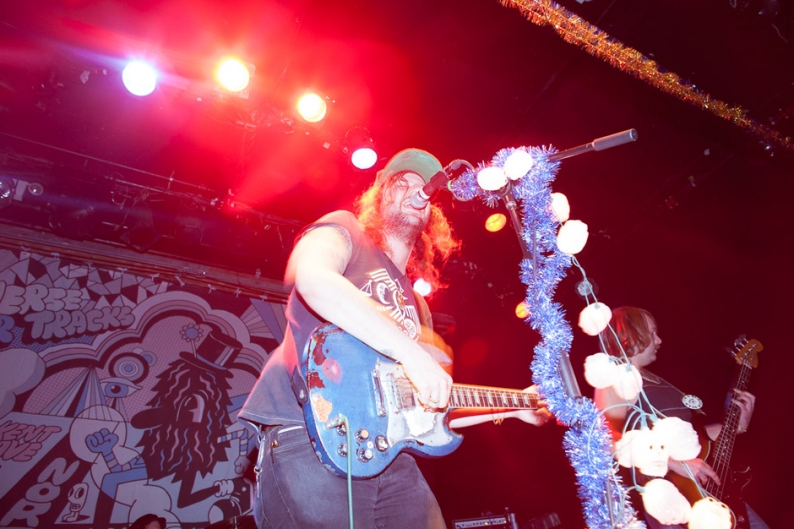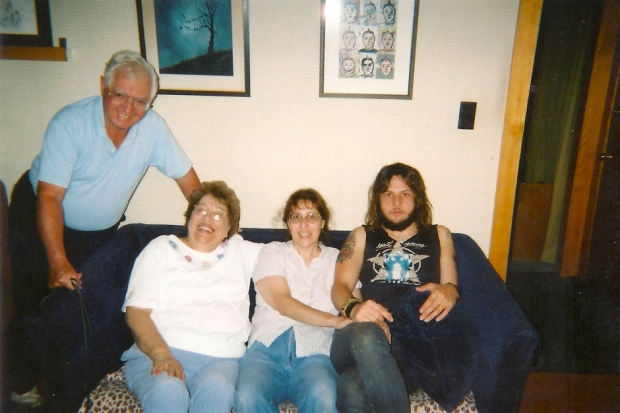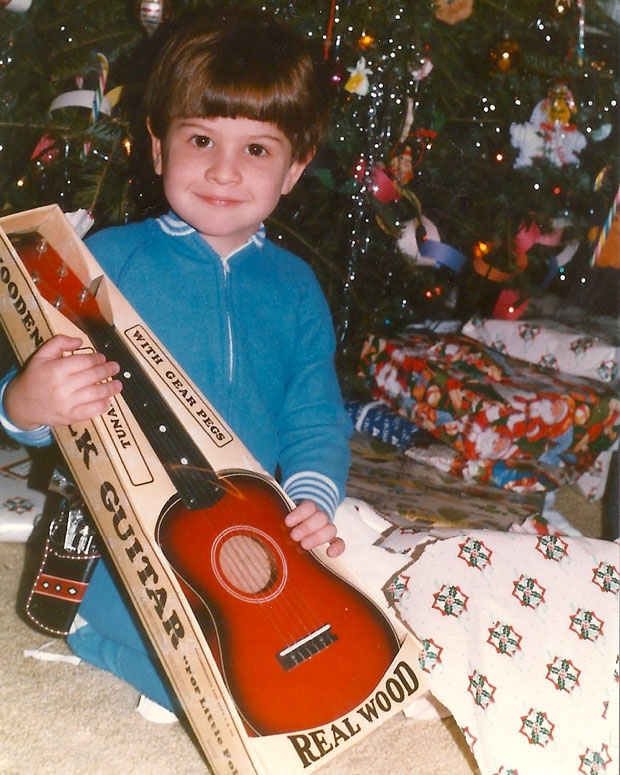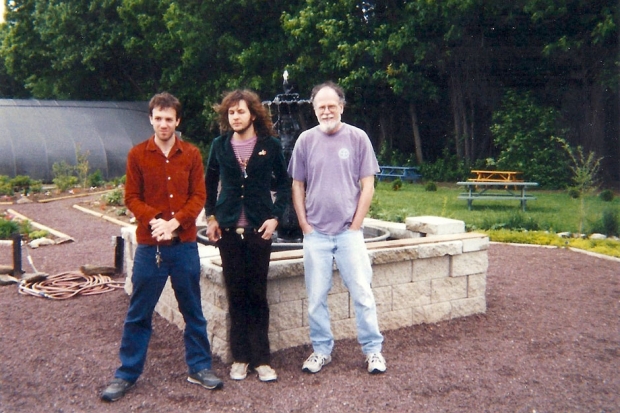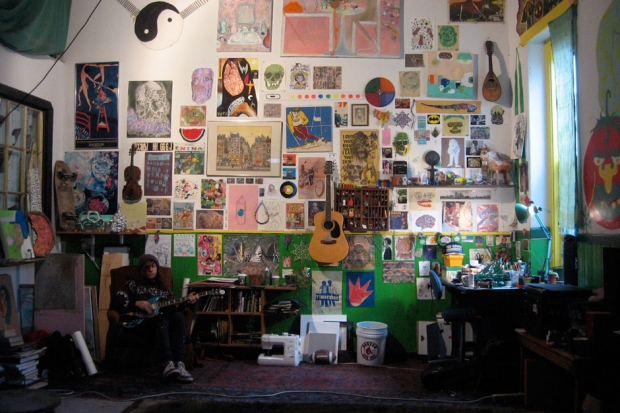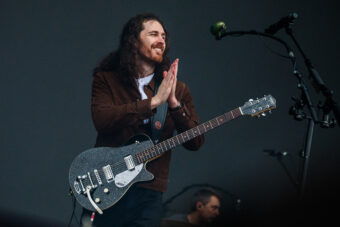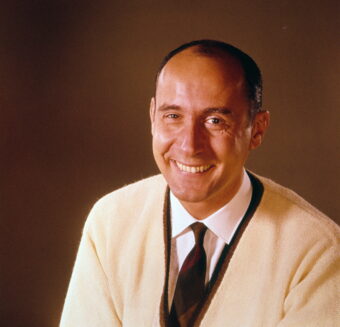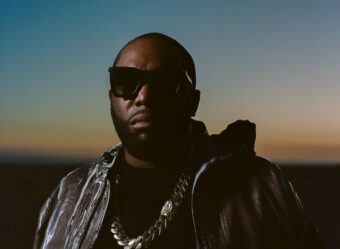Ten years ago, Kyle Thomas could be found most afternoons writing at Mocha Joe’s, a coffee shop in his hometown of Brattleboro, Vermont. The forever chameleonic, now 30-year-old mastermind behind King Tuff, Thomas was focused on crafting what would become Was Dead, a psychedelic gust of glammy and hammy, upside-down FM-rock magic that, after sadly limited runs on vinyl and cassette, is finally being reissued in wide, digital release by its biggest fans, Burger Records. For years, devotees have scoured eBay in hopes of finding a copy, the price tag climbing as the record’s legend grew. Now you can get it from Burger for only eight bucks (or in $25 or $50 deluxe packages with bonus goodies). So, here’s the story of this overlooked classic, as remembered by Thomas and his closest kin, from the first licks recorded at home with his parents, to the Brattleboro art space where he opted to re-record the album years later, to the process of bringing the finished product back from the dead.
THE BOMB SHELTER
Judith Thomas, a.k.a. “Lil Smashy,” Kyle’s mother: It started in the basement and his bedroom. The latter at that point was starting to get pretty moldy. The house that we live in was built in 1920. And in the ’50s and ’60s, when people were afraid of the Russians or Cubans bombing the United States, a lot of people built bomb shelters. So this house has its own makeshift shelter — not like a true bomb shelter, but this weird space that looks like a giant mouse has eaten a hole in one of its walls. You crawl through that hole and you’ll come into this room. Kyle recorded a lot in there and he recorded a lot in his bedroom. The quality of some of those songs might reflect that.
Also Read
Beastie Boys: Boychiks in the Hoodie
John Thomas, a.k.a. “Old Man Tuffy,” Kyle’s father: You definitely had to wade through stuff to find little pathways in his bedroom. We weren’t trying to invade his space too much — most guys don’t want their parents poking around in their rooms. But you’d have amps and four-tracks lying around. Posters were half hanging off the walls and he was working at a thrift shop so when people would bring shit in to donate he’d get the first pick. He’d constantly be bringing all sorts of weird stuff home. A lot of it would end up in his room in piles, and I still have this electric organ sitting in our garage. But it’s neat: You can see different relics from ten years ago, what kind of music he was listening to and a lot of his artwork. It’s like a little shrine to Kyle.
Kyle Thomas: I had just made this album called Mind Blow, a CD-R release on Spirit of Orr. This was in 2003. Quite a few of the songs from Was Dead were actually on that. And at that time, I was mostly just drinking coffee, sitting and writing songs in Mocha Joe’s all day. I just felt this really strong urge to write as many songs as I possibly could, all the time. I was focusing, sitting there, staring at a piece of paper. Something would come out eventually.
Judith Thomas: We were on a different schedule because Kyle is a night owl and I work days. If I wanted to see him, I’d just peek in the coffee shop after I got off work and see if he was in there or not. At that point we didn’t have cell phones. At night, I’d be sleeping and I’d hear him recording. The music would bleed into my dreams.
Kyle Thomas: I wasn’t really sharing music with them so much at that point, but they were hearing it anyway. They never complained or anything.
Judith Thomas: I know this sounds really awful, but I’m not as into music, so I don’t normally pay attention.
Luke Thomas, Kyle’s older brother: My dad raised us on rock and psychedelic music, so he was really psyched about those songs at the time. But musically, it’s not really my mom’s cup of tea.
Judith Thomas: If it’s just me in the house, I don’t have anything turned on. I have no music going, no television, nothing. But if John is awake or Kyle’s here, there’s always some kind of auditory input going on. Over the years I’ve learned to tune things out. And I know it sounds crappy, but it just isn’t as big of a part of my life as it is for them. I like music and I love listening to Kyle’s stuff, but I have other things that speak to me more. I like to cook. I’m a gardener. Kyle appreciates flowers, but he doesn’t weed or anything. When he was younger we were part of a community garden, but there was no way [he and Luke] were going to help me weed the garden. I would drag them there and then they would run off into the woods that surrounded it. But I was always pretty loose as far as chores and stuff when he was living with us. Kyle would tend to balk a little bit because he would rather not, but even though he’s twice my size I can still get him to do stuff.
John Thomas: Kyle seems to feel at his most creative at 3 or 4 in the morning. And there were definitely periods where he’d isolate himself and you might not see him for a day or two. You’d figure that he was just hiding away. But I think when he was doing a lot of the stuff most people were asleep.
Judith Thomas: At night, you’d hear these weird noises coming out of his bedroom and you’d think, “How the hell is that going to be anything?” And then when it was all done and you’d listen and you’d be like, “Oh my god!”
John Thomas: I remember the first time I heard Was Dead all laid out on a tape. You don’t hear how it’s going to come together until it’s already together. Then it was like, “God, it’s amazing.” He can put all those layers together and make it sound so good. It just popped when you heard it. I remember thinking it probably had a pretty good chance of reaching a wide audience. I could hear it in commercials.
Kyle Thomas: I knew there was something about “Sun Medallion,” in particular, because I just had to record it the second I wrote it. There was something different about it. “Freak When I’m Dead,” too. That was at a time that I was playing in Feathers, more of an acoustic band. I remember playing it for some of them and them looking at me like I was crazy or something — not that the songs are that crazy, but they’re just more rock’n’roll than what we were doing in that band. I was just like “Fuck you guys, I gotta go do this other thing.”
Luke Thomas: He’d bring me over to and for each song he’d say “You have to hear this one, this one’s a hit!”
Ruthie Garbus, best friend and Happy Birthday bandmate: He’d drag me down into his parents’ basement and have me record handclaps. He is a madman, has always been a madman — like this combination between Bon Jovi and Groucho Marx. When he was writing Was Dead, he was a super-talented kid barely out of his teens, but when he committed himself to re-recording it later on, in the recording space we shared (Vegetable Street), that was another era unto itself. I didn’t understand what he was doing. I was like, “Dude, it’s fine! Let’s stick with something that’s already good!” But that’s the thing about Kyle; he looks like a total slob, but he’s a fucking perfectionist.
THE BALLROOM
Kyle Thomas: I loved living with my parents — that’s probably why I did it for so long. But it was almost too easy to live there. I had to force myself to get out, had to challenge myself. I had to start a new chapter.
Luke Thomas: We all had this collective art space in a big old ballroom that was divided up by scrap wood and junk into little cubicles. It was a slightly more organized junkyard. I had just moved home from art school at the time. There were just people making stuff all over the place. Kyle set up in the middle of the room and started recording. He was really cranking out the albums back then and had a lot of little different bands going: Witch, Feathers, he even had this weird reggae band called Baked Earth.
Kyle Thomas: It was all part of this bigger studio called the Tinder Box. There were two ballrooms. Me and my brother and Ruthie and a bunch of other people were in one. The other was like the main show space. There were shows in there. There was a skate ramp in there. It was all in the top floor of a building in the middle of downtown. It was a vibrant time.
John Thomas: Brattleboro is a quirky place. It’s a mix of native Vermonters and farmers and it has an urban thing too because a lot of people from the cities have moved up to this area. You get this weird mix of people, a lot of transients and oddballs moving through.
Kyle Thomas: Everyone was always working on stuff and fueling each other. It was inspiring to be in that creative zone with a bunch of close friends. But I like recording by myself wherever I can, just because then I feel like I have ultimate freedom and I can just control whatever I want to put down. There’s something about going into your own little world. I recorded mostly between midnight and 5 a.m., just by myself in that big studio. It felt really good, which I think you can hear. It really came from the heart and the atmosphere there made it special. We skateboarded and painted walls. I painted an entire bathroom there to look like intestines.
Luke Thomas: I remember my friend coming up [to our space], having been strung out on acid for a couple of days and crashing on our couch. He slept through the whole recording process of “Freak When I’m Dead,” and the second Kyle stopped playing, he woke with a start and didn’t know where he was.
Kyle Thomas: After I finished re-recording the album, I hand-made a run of a couple hundred, screen-printed the covers and made CD-Rs, then went on tour with Matt and Kim while they were still playing house shows and stuff.
Ruth Garbus: To say he self-released it on CD-R is probably a stretch. I think he made them and handed them out to his friends.
Luke Thomas: I saw the first show of the tour and thought, “This sounds great live. This is going to be awesome.”
Kyle Thomas: It started in New England and went down the coast of Florida and then over to New Orleans and up through the Midwest and back. It was a great tour, it was really fun, but it was 2006. There wasn’t really that much rock’n’roll happening at that moment. It was a little bit of a different crowd for us. I didn’t feel like I was really connecting with anyone and then Matt and Kim would play and everyone would go wild. I thought, ‘Well, maybe I’m doing something wrong here.’
Luke Thomas: It just fizzled a bit and Kyle went on and did other things.
Kyle Thomas: I forgot about it for a while and then, about two years later, [Colonel Records] asked if they could put out the vinyl. I said sure. I wasn’t really planning on ever doing anything with it. Even when it came out, there wasn’t much publicity for it. It was just a slow leak. It slowly crept out into the world. It was even hard to get when it came out. People would randomly see it in a record store and just buy it thinking maybe it looked cool or something.
Luke Thomas: We’ve been collaborating on art since we were teenagers. We had a punk band and I’d do the covers and stuff. Kyle would always call me up and be like, “I need some art and I need it in like two days.” I’d be like, “Oh fuck.” With the Was Dead cover, he’d come up with the concept and I’d execute it — him peeking over the letters in this mischievous, iconic way. It’s really fitting of his persona. When we had it issued on vinyl, the people at the printing press told the label they were all getting migraines from the fluorescent colors all around. There were delays because of that. Mission accomplished.
John Thomas: It wasn’t like we were expecting a big huge wave of response because I think Kyle was surprised that the guy at Colonel even wanted to put it out. It’s almost like any attention he’d get for it was kind of cool. If it doesn’t make a huge splash…whatever. That someone thought it was valuable enough that they invested in it and even put it out in a limited way — that was cool. But then to hear that through the years there was this kind of underground following was just thrilling. I think Kyle was a little surprised, too.
THE RESURRECTION
Sean Bohrman, co-founder of Burger Records, Fullerton, California: There was this guy from Iowa, a fan of ours, and he sent me an email that said, “You need to check out King Tuff.” I did and I loved it. It was really, really, really good. This was probably 2008. We’d just started doing cassettes and I was just thinking about it like, “Man I want to put this out on cassette.”
Lee Rickard, co-founder of Burger Records: It sounded timeless, like it could have come out any time in the last 40 years.
Sean Bohrman: The songs just got stuck in my head. I was thinking about it constantly for weeks. There are only a handful of perfect albums in the history of rock’n’roll and I think Was Dead sits next to Weezer’s The Blue Album, a recent, perfect album — one of our generation’s best, if not the best. Every single song is amazing. It wasn’t widely heard yet and everyone we showed it to was blown away. There wasn’t one person that was like “Eh, it was pretty good.” Every single person was like, “Holy shit.”
Lee Rickard: It was on constant rotation in every car around town.
Sean Borman: I had to do something to get it out on Burger. Through the cosmos we knew somebody who knew somebody.
Lee Rickard: There are no coincidences.
Sean Bohrman: I told our friend Devon Williams about it, and his bandmate had grown up with Kyle. I said, “Oh my god, we need to get his number.” We did and I called him on the phone from my house after work one day and I was like, “Hey, we really, really like your record and we want to put it out on cassette.” He was kind of weirded-out that we just called him out of the blue, but he was into the idea, so we did it.
Kyle Thomas: I had just started playing with my band Happy Birthday. They called me during a band practice and I didn’t know who they were. I think I had just gotten a cell phone at that point and my bandmates were actually really pissed at me because I just picked up the phone in the middle of a practice. I was feeling kinda guilty about it. But [Sean and Lee] were like, “We want to put out your tape.” And I was like, “Sure, anything to get it out there.” I ended up meeting them at SXSW the next year. I was like, “Who are these guys?” They were like crazy cartoons. They were my kind of dudes. But I had no idea what the future would hold.
Sean Bohrman: We’d just started doing cassettes and I think Was Dead was release Number 16. We’re on like Number 467 now.
Kyle Thomas: They went on to sell thousands of copies on cassette.
Sean Bohrman: It’s the most popular tape we’ve ever pressed. We’ve done three or four thousand of the Was Dead tapes, the most we’ve ever done of one record. It’s been hard to get and the tape has been the only viable way to listen to it without paying huge sums on eBay or any of that stuff. It’s such a classic record and it’s so hard to find. But it shouldn’t be.
Kyle Thomas: I just want people to be able to get it, first and foremost. I just wanted it to be available to the world. People are always asking me if I have it at shows and it sucks to say, “Naw, I don’t have that.” But I’ve been trying.
Sean Bohrman: People should be able to hear this record. It shouldn’t be able to be heard only by collectors who are willing to pay $100 or $75. It should be shared and heard.
Lee Rickard: Every word, every riff. It’s a whole. I never just listen to one song. It’s not a single, it’s a fucking album. You listen to it all the way through and you flip it over and listen to it again and then you flip it again and start over. You can listen to that record all day if you want. We used to do that all the time.
Kyle Thomas: I was 18 when I wrote some of those songs, so there’s this teenage mindset behind a lot of them, this youthful feeling to them. Before, I didn’t really feel like I could listen to them and enjoy them. But those songs have a life of their own now — they became other people’s songs, fans’ songs. And when I play them live, I’ve just become some kind of medium. They feel like our songs as opposed to just mine. So I can enjoy them now, too.

